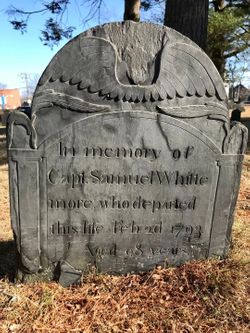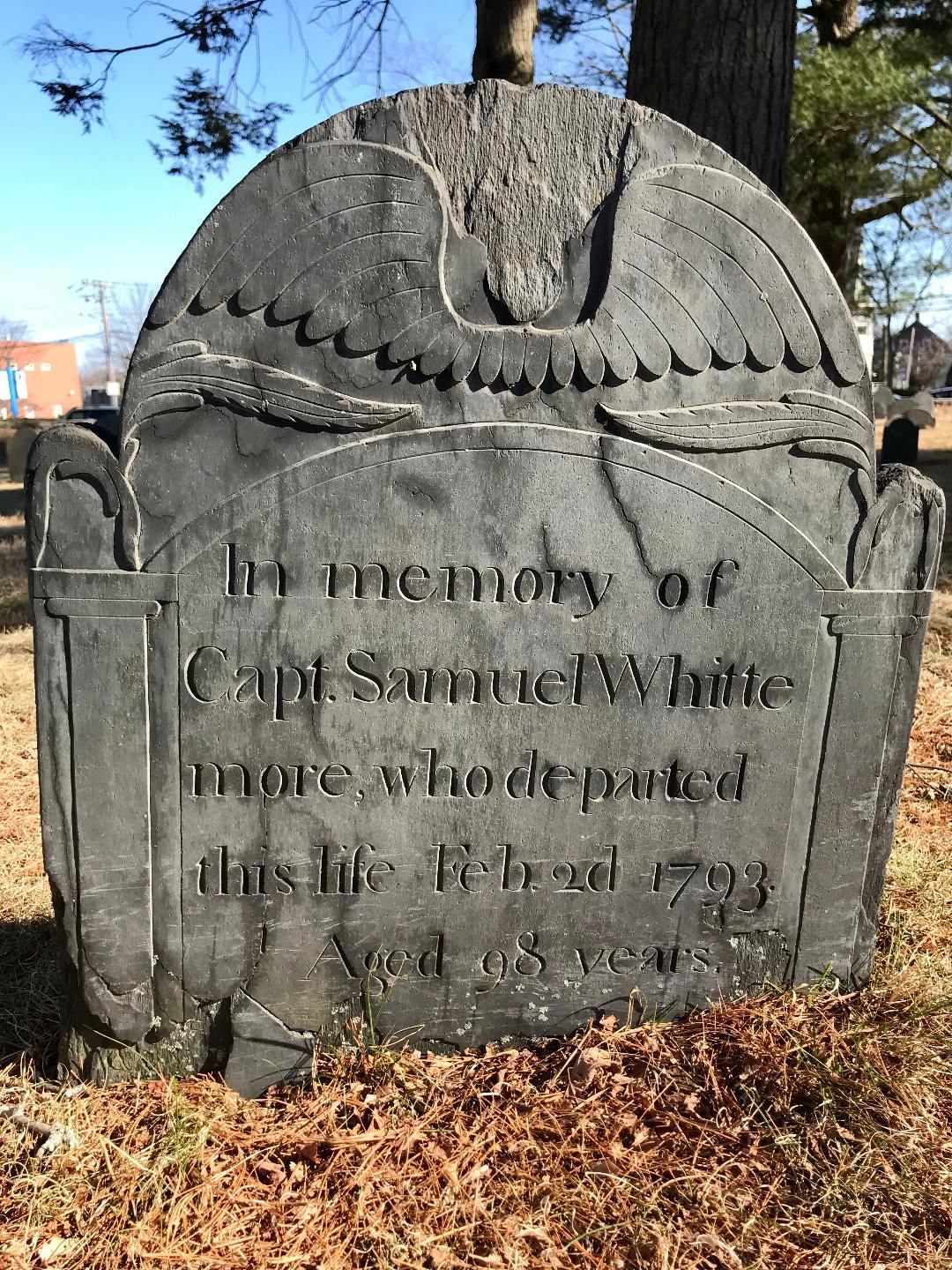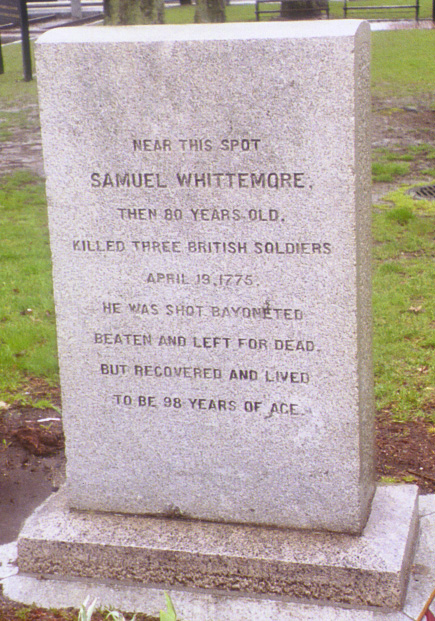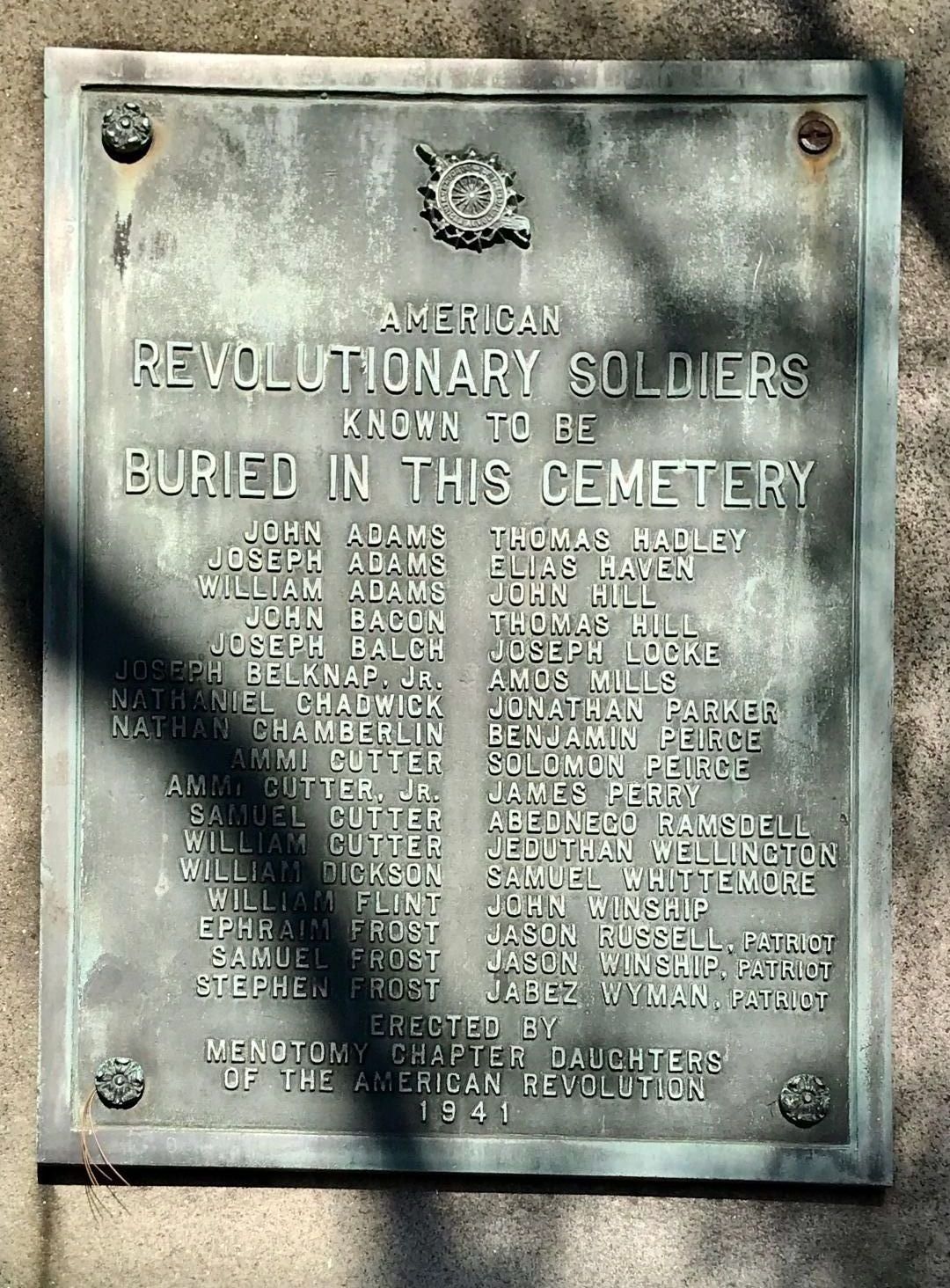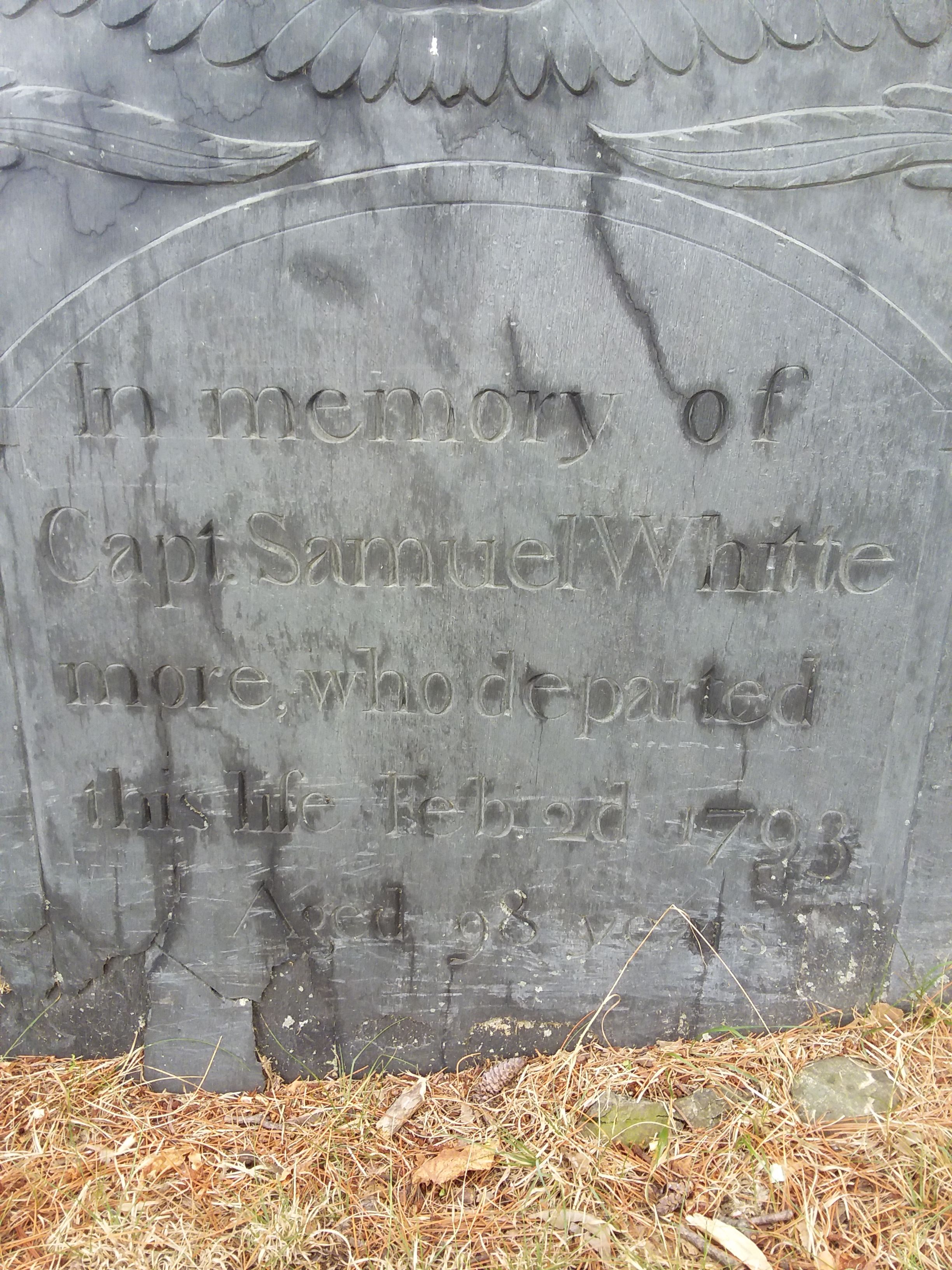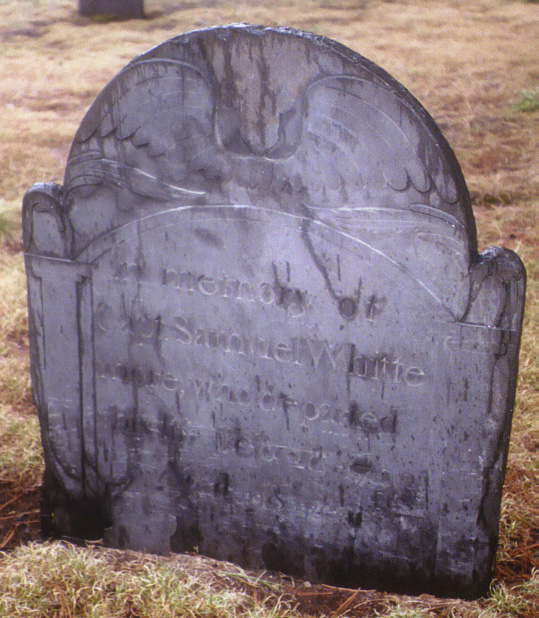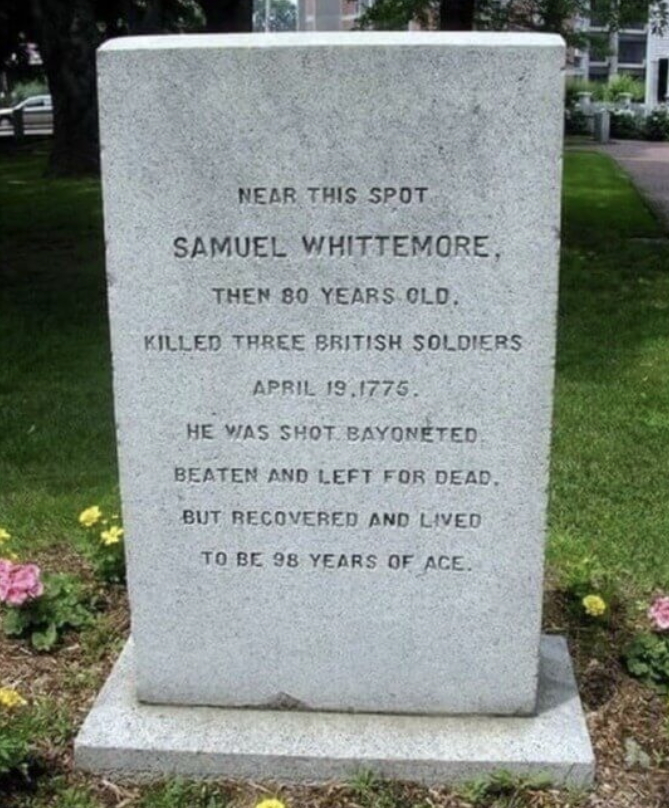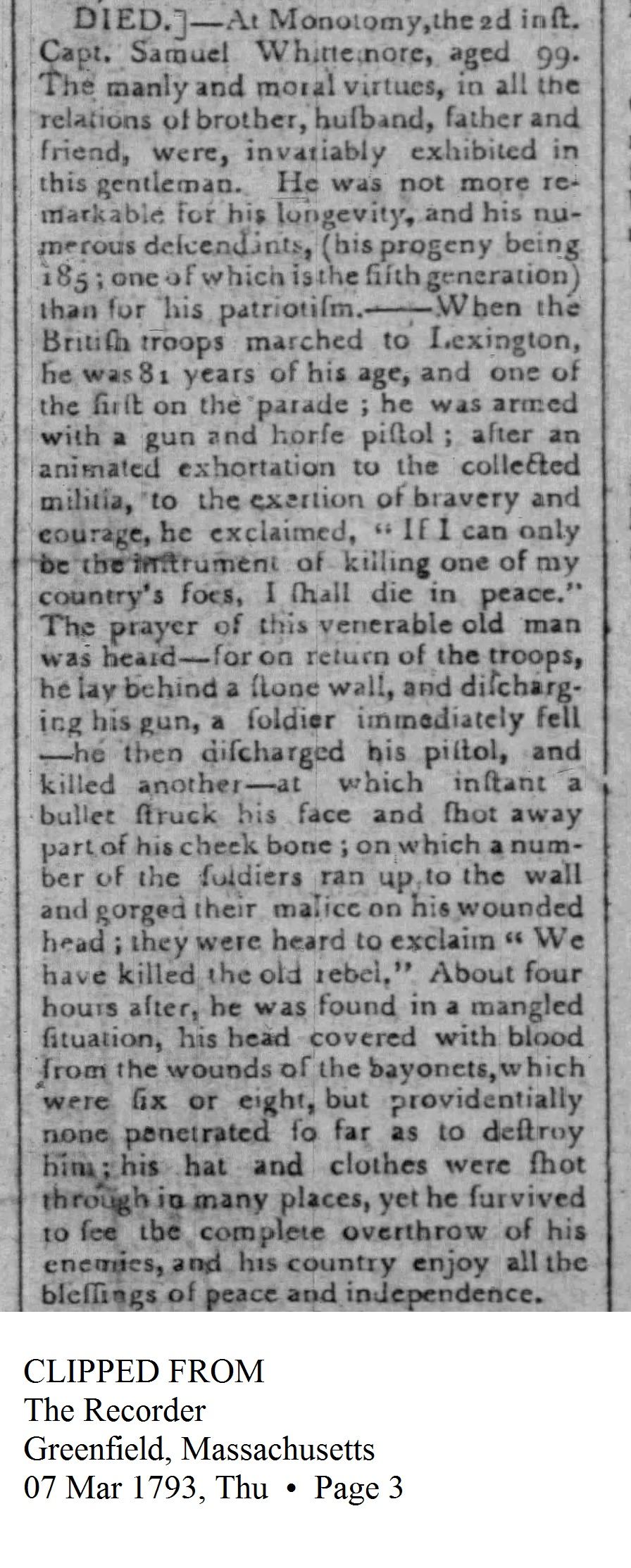The following biography is taken from Benjamin and William Cutler's History of the Town of Arlington, Massachusetts. Formerly the Second Precinct in Cambridge or District of Menotomy, Afterward the Town of West Cambridge. 1635-1879. With a Genealogical Register of the Inhabitants of the Precinct (Boston: David Clapp & Son, 1880):
At about the time of the killing of [brothers-in-law Jabez] Wyman and [Jason] Winship [inside Cooper's Tavern], Mr. Samuel Whittemore was wounded by the British flank-guard and left for dead, being the one wounded man of Menotomy mentioned in the lists of the American losses of that day. He was struck down nearly in the rear of Cooper's tavern, about where on "Russell Park" a monumental tablet has recently been erected (1878), with this inscription: "Near this spot Samuel Whittmore, then eighty years old, killed three British soldiers, April 19, 1775. He was shot, bayoneted, beaten, and left for dead, but recovered, and lived to be ninety-eight years of age." A sketch of him is given in the GENEALOGIES. He was a prominent citizen of the Precinct, and the progenitor of a great portion of the Whittemore family here. Paige, in his Hist. Camb., devotes considerable attention to him. A descendant, T.J. Whittemore, of Englewood, N.J., communicates the following, which has already been printed:
CAPT. SAMUEL WHITTEMORE. -- April 19, 1775. -- Mr. Editor, -- I find the following notice in the Columbian Centinel, viz.:
"Feby. 6, 1793. -- Died -- At Menotomy, Feby. 2 (1793), Capt. Samuel Whittemore, AE. 99. The many and moral virtues, in all the various relations of Brother, Husband, Father and Friend, were invariably exhibited in this gentleman. He was not more remarkable for his longevity, than his number of descendants (his progeny being 185), one of which is the 5th generation. When the British troops marched to Lexington (Ap. 19, 1775), he was 81 years of age, and one of the first on the parade; he was armed with a gun (King's arm) and horse pistols. After an animated exhortation to the collected militia, to the exercise of bravery and courage, he exclaimed; 'If I can only be the instrument of killing one of my country's foes, I shall die in peace!'
"The prayer of this venerable old man was heard, for on the return of the troops (from Lexington) he lay behind a stone wall and discharged his gun. A soldier immediately fell. He then discharged his pistol and killed another; at which instant a ball struck his face and shot away part of his cheek bone; on which a number of soldiers ran up the wall and gorged their malice on his wounded head; they were heard to exclaim, 'we have killed the old rebel.' About 4 hours after, he was found in a mangled situation, his head was covered with blood, from the wounds of the bayonet, which were 6 or 8, but providentially none penetrated so far as to destroy him. His hat and clothes were shot through in many places, yet he survived to see the complete overthrow of his enemies, and his country enjoy all the blessing of peace and independence. His funeral will be to-morrow at 4 o'clock, P.M., from his house at Menotomy, which his relations and friends are requested to attend."
NOTE. -- This old gentleman was posted in the rear of the house of Hon. James Russell, in West Cambridge, on the road to Woburn, awaiting the return of the enemy from Lexington. On discovering the flank-guard of the enemy (5 in number) approaching, a friend who was with him, deserted him, but he refused to run, saying, "I am eighty years old, and I will not leave, for I shall be willing to die if I can kill one British red coat." On the nearer approach of the "guard" he shot one with his gun and another with his pistol, and while raising his second pistol, he received a wound in his face. He fell, and soon the remaining three soldiers jumped over the wall, pierced him with their bayonets, and left his "for dead," as they supposed he was. On being found, he was faint from loss of blood, and life was just perceptible. He was taken to the hospital (Cooper's Tavern) on the corner of Medford Road, in West Cambridge. Surgeons Welch and Spring dressed his wounds (one shot wound and thirteen bayonet wounds).
Capt. Samuel was a large, athletic man, of a strong constitution, and recovered. He lived till Feb. 2, 1793, carrying to his grave fourteen wounds. He was not at the Concord fight, as has been stated. Before the Revolution he was a Captain of the Royal Dragoons, but as soon as an opportunity offered, he joined the patriot party and performed his share of duty in the army.
Capt. Samuel was father to William Whittemore, who graduated at Harvard College in 1755. He was born July 27, 1696, and his tombstone, now in the burying-ground in West Cambridge, has the following inscription, viz.: "In memory of Capt. Samuel Whittemore, who departed this life Feb. 2, 1793. Aged 98 years."
His children urged the old man to go over to "Hill's" (where all fled for safety from the enemy, who were soon expected to return from Lexington); but he sat knocking his flint and said he should not go -- "he was going to get a shot at them when they came back!" His daughter said, "Father, they will take you." Still rapping his flint, and not raising his head, he said: "They'll find it hard work to do it." After some weeks he so far recovered as to recognize his family, and one of his daughters asked him "if he was not sorry that he went out?" -- "No," said he, "I should do just so again."
Samuel Whittemore was grandson of Thomas Whittemore, who came to this country about 1643, and settled at Mystic side (Malden); he was descended from William, of Hitchen, co. of Herts, in England, who was born about 1540, and had brothers Thomas and Rowland.
Cambridge, April 19, 1859.
The following biography is taken from Benjamin and William Cutler's History of the Town of Arlington, Massachusetts. Formerly the Second Precinct in Cambridge or District of Menotomy, Afterward the Town of West Cambridge. 1635-1879. With a Genealogical Register of the Inhabitants of the Precinct (Boston: David Clapp & Son, 1880):
At about the time of the killing of [brothers-in-law Jabez] Wyman and [Jason] Winship [inside Cooper's Tavern], Mr. Samuel Whittemore was wounded by the British flank-guard and left for dead, being the one wounded man of Menotomy mentioned in the lists of the American losses of that day. He was struck down nearly in the rear of Cooper's tavern, about where on "Russell Park" a monumental tablet has recently been erected (1878), with this inscription: "Near this spot Samuel Whittmore, then eighty years old, killed three British soldiers, April 19, 1775. He was shot, bayoneted, beaten, and left for dead, but recovered, and lived to be ninety-eight years of age." A sketch of him is given in the GENEALOGIES. He was a prominent citizen of the Precinct, and the progenitor of a great portion of the Whittemore family here. Paige, in his Hist. Camb., devotes considerable attention to him. A descendant, T.J. Whittemore, of Englewood, N.J., communicates the following, which has already been printed:
CAPT. SAMUEL WHITTEMORE. -- April 19, 1775. -- Mr. Editor, -- I find the following notice in the Columbian Centinel, viz.:
"Feby. 6, 1793. -- Died -- At Menotomy, Feby. 2 (1793), Capt. Samuel Whittemore, AE. 99. The many and moral virtues, in all the various relations of Brother, Husband, Father and Friend, were invariably exhibited in this gentleman. He was not more remarkable for his longevity, than his number of descendants (his progeny being 185), one of which is the 5th generation. When the British troops marched to Lexington (Ap. 19, 1775), he was 81 years of age, and one of the first on the parade; he was armed with a gun (King's arm) and horse pistols. After an animated exhortation to the collected militia, to the exercise of bravery and courage, he exclaimed; 'If I can only be the instrument of killing one of my country's foes, I shall die in peace!'
"The prayer of this venerable old man was heard, for on the return of the troops (from Lexington) he lay behind a stone wall and discharged his gun. A soldier immediately fell. He then discharged his pistol and killed another; at which instant a ball struck his face and shot away part of his cheek bone; on which a number of soldiers ran up the wall and gorged their malice on his wounded head; they were heard to exclaim, 'we have killed the old rebel.' About 4 hours after, he was found in a mangled situation, his head was covered with blood, from the wounds of the bayonet, which were 6 or 8, but providentially none penetrated so far as to destroy him. His hat and clothes were shot through in many places, yet he survived to see the complete overthrow of his enemies, and his country enjoy all the blessing of peace and independence. His funeral will be to-morrow at 4 o'clock, P.M., from his house at Menotomy, which his relations and friends are requested to attend."
NOTE. -- This old gentleman was posted in the rear of the house of Hon. James Russell, in West Cambridge, on the road to Woburn, awaiting the return of the enemy from Lexington. On discovering the flank-guard of the enemy (5 in number) approaching, a friend who was with him, deserted him, but he refused to run, saying, "I am eighty years old, and I will not leave, for I shall be willing to die if I can kill one British red coat." On the nearer approach of the "guard" he shot one with his gun and another with his pistol, and while raising his second pistol, he received a wound in his face. He fell, and soon the remaining three soldiers jumped over the wall, pierced him with their bayonets, and left his "for dead," as they supposed he was. On being found, he was faint from loss of blood, and life was just perceptible. He was taken to the hospital (Cooper's Tavern) on the corner of Medford Road, in West Cambridge. Surgeons Welch and Spring dressed his wounds (one shot wound and thirteen bayonet wounds).
Capt. Samuel was a large, athletic man, of a strong constitution, and recovered. He lived till Feb. 2, 1793, carrying to his grave fourteen wounds. He was not at the Concord fight, as has been stated. Before the Revolution he was a Captain of the Royal Dragoons, but as soon as an opportunity offered, he joined the patriot party and performed his share of duty in the army.
Capt. Samuel was father to William Whittemore, who graduated at Harvard College in 1755. He was born July 27, 1696, and his tombstone, now in the burying-ground in West Cambridge, has the following inscription, viz.: "In memory of Capt. Samuel Whittemore, who departed this life Feb. 2, 1793. Aged 98 years."
His children urged the old man to go over to "Hill's" (where all fled for safety from the enemy, who were soon expected to return from Lexington); but he sat knocking his flint and said he should not go -- "he was going to get a shot at them when they came back!" His daughter said, "Father, they will take you." Still rapping his flint, and not raising his head, he said: "They'll find it hard work to do it." After some weeks he so far recovered as to recognize his family, and one of his daughters asked him "if he was not sorry that he went out?" -- "No," said he, "I should do just so again."
Samuel Whittemore was grandson of Thomas Whittemore, who came to this country about 1643, and settled at Mystic side (Malden); he was descended from William, of Hitchen, co. of Herts, in England, who was born about 1540, and had brothers Thomas and Rowland.
Cambridge, April 19, 1859.
Inscription
In memory of
Capt. Samuel Whitte
more, who departed
this life Feb. 2d 1793
Aged 98 years
